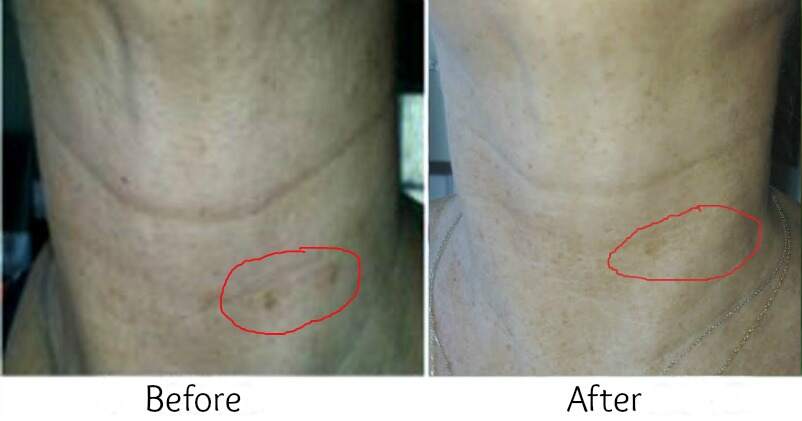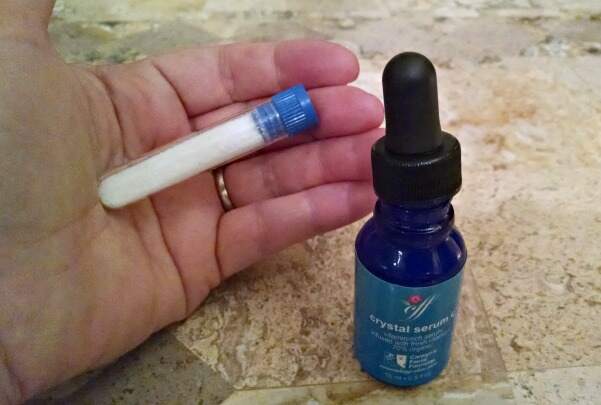- Home
- Popular Ingredients
- Vitamin C for Skin Aging
I may earn from qualified Amazon & Affiliate purchases at no cost to you.
Topical Vitamin C for Skin Aging
by: Linda Robison / Facial Fitness Specialist @ ABZ
Pure Vitamin C for Skin Aging: If vitamin C is a skincare superhero, why don't we always see the promised benefits? Are we using the wrong kind of topical C?
I'll show you what type of vitamin C skin care products really do work. See my before and after pictures too!

Key discoveries: Vitamin C skin care benefits
I did some investigating to see what the deal is with topical vitamin C for skin health and anti-aging, and here is what I found:
- Freshness. How long has your vitamin C cream/serum been sitting around in a warehouse? How do you know it hasn't lost potency or, worse, oxidized?
- Potency. Most studies on the benefits of topical vitamin C for skin aging used a 10% or higher concentration of vitamin C. If it's less than 10%…don't even bother!
- Type. Many studies show that L-ascorbic acid is the best type of vitamin C because of its ability to penetrate skin cells. A study, published in the journal Antioxidants (Basel), suggest that L-Ascorbic acid is the most beneficial type for skin health. It helps combat aging by reducing oxidative stress, promoting collagen production, and preventing skin aging.
- Exfoliation. To help vitamin C penetrate better (and for faster results), exfoliate your face a few times a week to speed up cell turn over and get rid of those brown spots.
Once I found a product that met all these points … I saw those wonderful benefits I've been reading about, especially on my face and neck.

My winning formula: Type of vitamin C I use for best results
The product I use contains a 16% concentration of L-ascorbic vitamin C. It is mixed with vitamin-enriched cocktail serum (that's pH balanced and 70% organic) and each bottle lasts about 30–40 days.
So it's fresh when you apply it. Unlike vitamin C products that have been premixed and sitting on the shelves for months, maybe years.
NOTE: It's important to exfoliate a few times a week to speed up cell turnover and help remove the brown dead skin cells.
Additional Products I Used:
For my results above, I also exfoliated 3 times a week using the Cleansing Scrub. Then I use a Botanical Masque with organic apple cider vinegar on the other days.
Application Update:
I no longer pour the entire vitamin C container directly into the moisturizing serum bottle.
Instead, I sprinkle a small amount of vitamin C powder directly into the palm of my hand, add a drop of serum, mix it, and apply that directly to my face.
As soon as ascorbic acid is exposed to liquid, oil, heat, light or air it begins to break down, oxidize and loses potency.
So to get the freshest possible vitamin C into my skin, I mix a small amount of vitamin C before each use.
Watch this video to see how Carolyn mixes a fresh application of vitamin C serum.
Perfect for any skin type, especially dry, mature, wrinkled. And works very well to lighten dark or brown spots.
It does not get any better than that!
Vitamin C for collagen building: Best results
Research shows, and skin experts agree, that topical L-ascorbic acid is one of the most stable forms of vitamin C and is very effective at penetrating and rejuvenating the skin.
When you apply this form of vitamin C directly to the skin, it can provide concentrations of up to 200 times more within the skin tissues compared to taking vitamin C orally.
But, for the best results, consider these facts:
Concentration Levels: Use a concentration of at least 10% or higher with a pH of 3.0–3.5. If you have sensitive skin, starting with lower concentrations and gradually increasing is a good idea.
Stability of the Product: Vitamin C can be unstable and degrade very quickly, especially when exposed to light and air. Make sure to keep your vitamin C in a cool, dry area and securely closed after each use.
Consistency in Use: Consistency is key for seeing results with vitamin C. It should ideally be used regularly as part of a skincare routine rather than sporadically.
Does vitamin C serum bleach skin?
No, it won't bleach skin tone or cause weird white spots, which can happen with chemical skin lighteners. But, with regular use, a fresh, potent vitamin C serum can help lighten brown spots, sun spots and age spots.
How does its lightning ability match vitamin B3 – niacinamide? Vitamin C is more potent but can be more irritating if you have sensitive skin.
How does vitamin C compare to vitamin B3 niacinamide to brighten skin?
Both vitamin C and niacinamide are known for their ability to address skin discoloration and even out skin tone, but they work in different ways and have unique strengths. Comparing the two, while both vitamin C and niacinamide have skin-lightening properties, but they target different steps in the melanin production process.
See how niacinamide works to brighten skin, is the effect permanent, how long does it take, and how much to use.
Vitamin C: helps inhibit melanin production and reduce the appearance of dark spots and hyperpigmentation.
Niacinamide: works by inhibiting the transfer of melanin to the upper cell layers, the part of the skin you can see. This reduces the accumulation of pigmented cells and therefore reduces dark spots.
Some studies suggest that vitamin C may be more effective in reducing melanin production, making it potentially more potent in lightening the skin. But, others suggest that using both can bring about even better results.
Why use fresh Vitamin C?
Most experienced skin experts agree that, when applied topically, the right type and potency of C can help:
- reduce sun damage like age spots or hyperpigmentation
- reduce fine lines and wrinkles
- improve firmness and tone
- increase skin brightness
- reverse age-related skin damage from bad habits, UV damage and pollutants
And because this vitamin can help stimulate collagen production and increase skin repair rate, you may see healthier, smoother skin faster. You can actually reverse age and environmental damage within a few months.
But to get significant results and anti-aging benefits, you need to apply your C cream or serum within a short time after it's been opened or premix the vitamin C powder in your hand with your favorite moisturizer.
Note: Don't mix it with face oils, as the vitamin C needs a water-based moisturizer to fully dissolve.
What to look for in your product
If you're interested in trying vitamin C for skin related issues like age spots, sagging, or fine lines. It's worth taking the time to investigate the product fully before making a purchase and make sure it:
- contains the most highly absorbable form called L-ascorbic acid
- has at least 10% concentration or higher
- is pH balanced for sensitive skin
- is packed in airtight AND dark containers to preserve it; or
- can be mixed up fresh before each use
Remember: Light and oxygen will cause it to oxidize and lose potency quickly. That means you're not getting all the benefits for skin aging. It also helps if it's mixed with other antioxidants and vitamins, which not only benefits the skin further - but helps keep the vitamin C fresher longer.
Vitamin C for skin aging: Products serums and creams
If you're looking for the freshest topical vitamin C serum, then your best bet is to purchase it dry and mix right before using, like the one I use.
Where can you get the freshest Vitamin C?
1. At this time, we only know of one supplier who offers small containers of fresh dry-packed L-ascorbic acid along with a bottle of vitamin rich hydrating serum that's 70% organic.
2. Another alternative is to use pure L-ascorbic acid booster in liquid form and mix it with your favorite cream or moisturizer just before applying to your face. Note: The benefit of this product is that it also contains niacin for anti-aging and extra skin lightening benefits.
3. You can also find L-Ascorbic powder online and mix that with your own creams.
4. For sensitive skin, there's a version of vitamin C serum (tetrahexyldecyl ascorbate) that is amazing and super hydrating. What makes tetrahexyldecyl ascorbate (THD Ascorbate Serum) different?
This advanced serum features a stable, oil-soluble form of vitamin C. This serum offers several key benefits:
- Stability: Unlike regular Vitamin C (ascorbic acid), tetrahexyldecyl ascorbate is more stable, meaning it maintains its potency and effectiveness over time.
- Skin Penetration: As an oil-soluble form of Vitamin C, it can penetrate the skin more deeply, reaching the dermis where it can stimulate collagen production and provide antioxidant protection.
Important Note: THD Ascorbate Vitamin C Serum is one of the best forms to use after skin treatments like at-home dermaplaning since it won't sting or cause irritation. Get the best tips on how to apply vitamin C after dermaplaning.
Potential side effects
Skin Irritation: Some individuals may experience skin irritation, redness, or a tingling sensation when first using vitamin C products. This is more common with higher concentrations.
NOTE: Personally, I notice a warm sensation when I first started using this vitamin C powder. But, after a few weeks, that went away.
Allergic Reactions: While rare, allergic reactions to vitamin C can occur. It's advisable to perform a patch test before applying it to the entire face.
Photosensitivity: Vitamin C may increase sensitivity to sunlight. It's crucial to use a good full spectrum sunscreen when incorporating vitamin C into your skincare routine to protect the skin from UV damage. Hint: Look for sunscreens that have a PFF+++ rating.
Have you tried skin or makeup products containing
vitamin C? Which ones and what did you think? Leave a comment here and share your thoughts.
References:
Clin Cosmet Investig Dermatol. 2018 May 29;11:253-263. doi: 10.2147/CCID.S161352. eCollection 201
About the Author:
Linda Robison is a Facial Fitness Specialist and the founder of Anti-Aging Beauty Zone. She shares expert insights on skincare, facial rejuvenation, and beauty treatments—blending traditional wisdom, personal experience, and science-backed research for both at-home and in-office solutions.
Before you go ....
Please tap on the💙in the bottom right corner if you found this page helpful. Also, Let’s CONNECT! Click the buttons below to follow me on social media.
Thanks so much!






